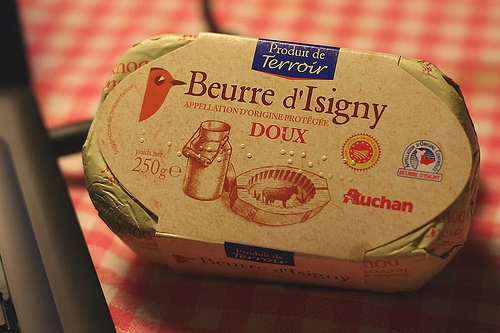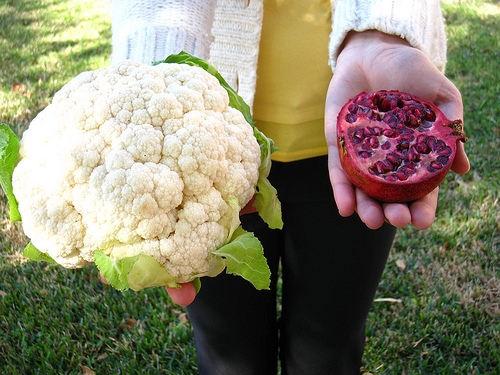Butter: exploring the ‘French Paradox’
Les français and Australians tend to disagree in their preference between butter and margarine. The French value taste over the consequences of consuming high levels of saturated fat. Australians accept a less satisfying palatable experience for a corresponding reduction in harmful fats and calories. Is one right and the other wrong?
For years people have talked of the French paradox, a phrase that describes the apparent mismatch between the French diet and their national health statistics. Consider this: Australia has 24.6 percent obesity versus just eleven percent in France according to the latest study by the OECD.¹ And yet the French eat butter – surely these two facts are incompatible?
Supermarket stocks reflect national preferences
There are twice as many variations of butter available in supermarkets in France than in Australia and far more brand choice. Conversely, margarine occupies far less shelf space in Monoprix throughout France, than it does in Woolworths in Australia. The irony here is that it was in fact a Frenchman who invented margarine.
“[In] the 1860s, butter had become so in demand in France that Emperor Napoleon III offered prize money for an inexpensive substitute to supplement France’s inadequate butter supplies. A French chemist claimed the prize with the invention of margarine in 1869. The first margarine was beef tallow flavoured with milk and worked like butter; vegetable margarine followed after the development of hydrogenated oils around 1900.”²
Why do Australians avoid butter?
Australians’ aversion to butter may be largely influenced by extensive national health promotion activity. The strength of these campaigns lies in the fact that they are undertaken not only by margarine producers, but also by independent bodies such as the Victorian State Government and the Heart Foundation. They encourage Australians to choose margarine over butter citing high cholesterol levels and obesity as the major risk factors associated with a high fat diet.
But have these health campaigns only succeeded in making Australians apprehensive about eating real, natural food? Fear of fat has us reaching for over-processed products that are manufactured in laboratories rather than grown in fields.
Nutritionist Joan Gussow echoes this sentiment: “As for butter vs margarine, I trust cows more than chemists.”³
And so do the French, it seems!
Consequences of focusing on fat
According to the Dietary Guidelines for Australians from as young as the age of two it is preferable for Australians to consume low-fat dairy products in order to limit their overall saturated fat intake.? But have we taken things too far?
Following this guideline to the letter results in Australian consumers focusing on reducing fat to the exclusion of everything else?. The issue here is that by removing most of the fat, processed products suffer a loss of flavour and mouth feel. Sugar or salt is often added to compensate for this, and can dramatically reduce the overall healthiness of the product.
In addition to this, eating a product labeled low or no-fat often makes people think they can eat more.
“People feel virtuous. It’s almost like it’s a guilt-free food,” Professor Karin O’Dea says?.
Food guilt
This concept of food guilt is notably absent from French food culture.
Moderation is key and a little butter on their (white bread) baguette won’t send them into a frenzied cycle of shame and overcompensation. Australians on the other hand, it seems, must navigate a minefield of guilt just to decide what to have for lunch.
By the time we’ve calculated the calorie count, figured out the fat per serve and ‘googled’ the Glycemic Index of our added-fibre-wholegrain-bread spread with our dairy-free-plant-based-added-calcium-margarine and stuffed it full of cauliflower and pomegranate seeds (or whatever the latest super food is) – we’re far too exhausted to enjoy the sandwich. Let alone feel satisfied by it.
It makes me wonder, in a nation where calorie counting is the flavour du jour and low-fat products are ubiquitous in our supermarkets, have we got it all wrong?
Perhaps we need to take a leaf out of Mireille Guiliano’s book French Women Don’t Get Fat and emulate the French who, she says, “eat with their heads, and they do not leave the table feeling stuffed or guilty”.
And perhaps it’s high time we stopped indignantly referring to the French paradox and considered accepting that the answer to good health might really be as simple as eating good quality foods in moderation just the way the French do! C’est tout.
References:¹ OECD Obesity Update 2012 (pdf, 7 pages)
² http://en.wikipedia.org/wiki/Butter
³ http://www.happyhealthybalance.net
?Dietary Guidelines for Australians (pdf, 28 pages)
?http://www.abc.net.au/health, Johnson, Cathy (for ABC Health and Wellbeing), Interview with Professor Kerin O’Dea ‘Are low-fat foods always a healthy choice?’, 27/04/2011 Image credits:
1. Image credit: Ruby Slippers in Italy on Flickr
2. Mike lowe on Flickr
3. Image credit: Monkeyc.net on Flickr
4. Image credit: Cake in Milk on Flickr
5. Image credit: MD Anderson’s Focused on Health on Flickr












I was wondering if you were going to mention the book French Women Don’t Get Fat- and then you did ! Such a great read and so true about French regimes. How I envy them their guiltless, balanced ways !
Merci, Bethany! What I particularly like about French Women Don’t Get Fat is that Mireille’s insights make good sense and are adaptable to our own countries of residence. And it’s interesting as well for me to challenge the ingrained notion that healthy eating has to equal deprivation.
How interesting! Thre’s only one point on which I don’t agree with you: I think a lot of French women feel guilty for what they eat, especially nowadays. I didn’t know about the French paradox until I arrived in Melbourne. I’m very curious, what are the so-called French secrets for their sveltness in the book?
Thanks Valentine – that’s a really interesting point about food guilt being felt by the modern French woman!
There are sadly many Australian women (and I don’t think we are the only ones in the world!) who go through a whole lot of mental anguish just because they have a piece of cake, rather than savouring and appreciating every mouthful as an occasional treat.
One point that is made in the book is that French woman aim for balance over a period of time (e.g. a week), so an indulgent Sunday lunch might mean a lighter Monday lunch and dinner.
Mireille also offers a key piece of advice about identifying your main ‘offenders’ (for me it is chocolate after dinner) and ensuring that when you do eat those foods you appreciate and enjoy it for the treat it is and over time, can be satisfied with less of it. For me, I’m currently attempting to get down to 2 squares a night!
Thanks for your comment Alison (I’m sorry to answer late, I had not seen it). Now I understand what these ‘French secrets’ are. The balance tip makes sense, definitely. The second tip seems harder to apply. I admire you for trying to reduce chocolate, it’s not that easy! 😉
Thanks Valentine – Yes I agree it is hard! Though I am slowly curbing my sugar addiction and find now that 2 squares of good quality dark chocolate savoured with a cup of herbal tea at night are more satisfying than large quantities of cheap Easter chocolate! But I am sure there will be moments and days where this is still a challenge for me 🙂